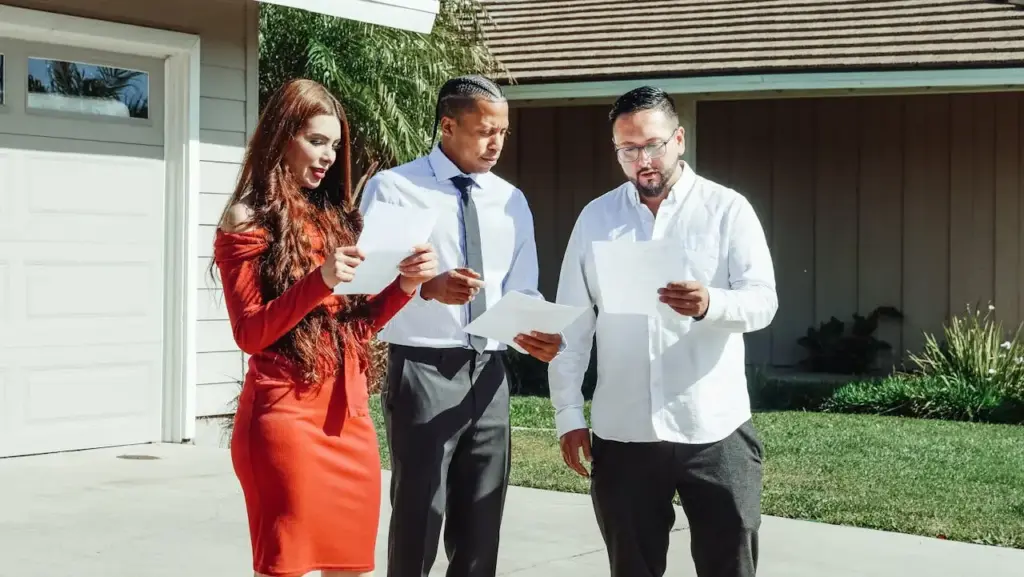Let’s talk about your spring real estate marketing plan. Spring is one of the hottest seasons in real estate—but are you really ready to make the most of it? Many agents rush into the season with outdated marketing strategies or scattershot efforts that miss the mark. Let’s break down the three biggest spring real estate marketing mistakes we see, and how to fix them before they cost you serious leads.
Spring real estate buyers start their search early, and if your marketing isn’t live until April, you’ve already missed a prime window. Your ads, social media, and ideally your sellers’ listings too should be prepped and promoted in advance—not after the rush starts. Start teasing listings, running local awareness ads, and warming up your database as early as February or March to get ahead of the competition.
Tip: Build a spring real estate marketing content calendar that includes email, social media, and listing launches with firm dates to stay consistent.

Buyers and sellers are savvier than ever, and they’ve probably seen last year’s graphics, captions, and videos already. That’s why using stale or recycled real estate marketing content can make your brand feel out of touch. Instead, update your visuals, write fresh descriptions, and tailor messaging around 2025 market trends like low inventory and rising buyer demand.
Tip: Use ChatGPT or Canva to refresh your headlines, test new post formats like Reels or carousels, and inject timely stats or headlines to stay current.

When you get busy, it’s easy to forget about your past clients, cool leads, and your local network. But this is exactly when staying in touch matters most. Sending a spring newsletter, dropping a quick personalized message, or showing up on social consistently helps you stay top of mind during this high-opportunity season.
Tip: Segment your email list by buyers, sellers, and past clients so your outreach feels more personal and relevant.

The agents who win in spring are the ones who show up early, show up smart, and stay connected. Avoiding these three marketing mistakes can mean the difference between a season of slow showings or a calendar packed with appointments. Start refining your strategy now—and make this your best spring yet.
Real estate lead generation in 2025 isn’t what it used to be. With more competition and fewer buyers in the market, the methods that worked in previous years may not cut it now. We put today’s top lead gen strategies for Realtors to the test—from video marketing and paid ads to good old-fashioned referrals. Here’s what actually works, what’s fading fast, and how to build a smarter real estate lead gen plan this year.
Facebook, Instagram, and even TikTok ads can still deliver strong results—but only if they’re highly targeted and offer real value. In our tests, paid ads worked best when paired with high-quality visuals, strong calls-to-action, and landing pages built to convert.
Pros:
Cons:
Best For: Agents with a clear offer and budget for testing.

Optimizing your website and Google Business Profile doesn’t provide instant gratification, but it does build trust and organic visibility over time. We saw major lead volume improvements for agents who invested consistently in SEO, local content, and collecting reviews.
Pros:
Cons:
Best For: Agents committed to long-term growth and local visibility.

Never underestimate the power of a happy client for real estate lead generation. The most consistent, highest-converting leads in our test came from referral and repeat business campaigns. Email nurture sequences, check-in texts, and social media shoutouts helped agents stay top-of-mind and drive re-engagement.
Pros:
Cons:
Best For: Agents with a healthy client database and great service track record.

There’s no one-size-fits-all solution for Realtor lead generation, but the best lead generation strategies in 2025 are built around value, consistency, and connection. Whether you lean into paid ads, SEO, or relationship-based marketing, make sure your lead gen efforts are intentional and trackable. Combine short-term wins with long-term systems, and you’ll set yourself up for real growth.
You’re spending money on digital ads for Realtors, but the leads just aren’t rolling in. Sound familiar? Whether you’re using Facebook, Instagram, or Google Ads, there’s a good chance your digital ad strategy needs a refresh. From mismatched targeting to vague messaging, small missteps can seriously hurt your ROI. Here are three of the biggest mistakes most Realtors make with digital ads—and how to fix them fast.
One of the biggest culprits behind underperforming digital ads for Realtors? Poor audience targeting. Casting too wide a net means your message gets lost. Getting too specific might shrink your pool of potential leads to near zero.
How to Fix It:
Smart targeting ensures your ads are seen by the right people—the ones likely to click and convert.

Real estate is competitive, and so are digital ads for Realtors. If your ad doesn’t stand out or clearly communicate your value, users will scroll right past. Generic phrases like “Beautiful home for sale” or “Great location” just won’t cut it.
How to Fix It:
Clear messaging leads to clear action and more qualified leads.

Running digital ads for Realtors without analyzing performance is like driving with your eyes closed. Even well-targeted, well-written ads can underperform if you’re not tracking and adjusting.
How to Fix It:
Optimization turns your ad budget into a powerful tool—not a guessing game.

Digital ads for Realtors aren’t magic—they simply require the right strategy. By refining your targeting, dialing in your messaging, and tracking what’s working, you can turn underperforming ads into steady lead generators. Don’t keep wasting your budget—start fixing the small things that make a big difference.
Let’s talk about your real estate email marketing strategy. Are you still blasting the same, tired email newsletter to your entire list? If you’re not getting responses—or worse, you’re getting unsubscribes—then it’s time for a change. Email remains one of the most powerful marketing tools for Realtors, but only if it’s done right. Let’s walk through three ways to modernize your real estate email strategy using automation, personalization, and segmentation.
Any experienced real estate agent knows that manual follow-ups are time-consuming and often become inconsistent. That’s why we like automated email sequences that let you deliver timely, relevant messages without lifting a finger.
Smart Email Marketing Automation Ideas for Realtors:
The result? Less time spent on repetitive tasks and a better client experience.

Adding someone’s name to the subject line isn’t personalization—it’s basic formatting. Today’s consumers expect emails that reflect their actual interests and behaviors.
Easy Upgrades for Your Marketing Emails:
When done right, personalized emails feel less like marketing and more like value delivered straight to your contact’s inbox.

If your entire contact list gets the same real estate marketing email, you’re likely turning off more people than you’re attracting. Segmentation allows you to send the right message to the right group—dramatically improving open and click rates.
List Segmentation Examples for Realtors:
Use your CRM to tag and organize leads based on their stage, interests, and behaviors. Over time, these micro-targeted messages will build stronger engagement and better results

Email marketing for Realtors isn’t dead. In fact, it’s more powerful than ever—if you take the time to modernize your approach. With automation, personalization, and segmentation on your side, you can nurture leads, win more listings, and stay top-of-mind without burning out.
The best real estate listing agents know that a well-run open house can generate buzz, build connections, and lead to serious offers—but only if it’s executed with strategy and intention. If you’re relying on basic signage and hoping for walk-ins, it’s time to rethink your approach. This high-converting open house checklist will help you plan, promote, and follow up like a pro.
If you’re looking to create a high-converting open house, your results will depend heavily on what you do before anyone shows up. Pre-event marketing ensures that the right buyers—motivated and qualified—actually walk through the door.
Checklist for Pre-Event Promotion:

A high-converting open house isn’t just about the sheer volume of visitors. It’s about engagement. You want buyers to linger, ask questions, and imagine themselves in the space.
Checklist for On-Site Setup:

The best listing agents know that the open house isn’t over when the last person leaves—it’s just beginning. Following up quickly and personally can be the difference between a missed opportunity and a new client.
Checklist for Follow-Up:

Open houses are more than just a weekend tradition—they’re a key lead generation tool when done right. With the right mix of promotion, preparation, and follow-up, you can turn casual browsers into committed buyers. Use this checklist to create experiences that stand out and drive results every time.
For real estate agents, hosting a high-converting open house isn’t just about unlocking the door and hoping for buyers. An open house is a strategic marketing event that, when done right, generates serious interest and potential offers while connecting you to prospective new homebuyer clients looking in the area. Whether you’re a new listing agent hosting your first open houses, or a more experienced Realtor looking to refine your approach, this open house checklist will help you maximize attendance, engagement, and follow-up to turn visitors into clients.
Experienced Realtors and listing agents know that your open house success starts long before buyers walk through the door. Effective marketing ensures you’re attracting the right audience and maximizing attendance.
📌 Checklist for pre-event marketing:
✔ List your open house on the MLS and major real estate platforms.
✔ Promote the event across social media, email, and local groups.
✔ Run targeted Facebook and Instagram ads to reach local buyers.
✔ Send personal invitations to potential leads and neighbors.
✔ Use video teasers or live walkthroughs to generate buzz.
Real-world example: One listing agent saw a 50% increase in open house attendance after using a short-form Instagram video to highlight the property’s best features.

Once your open-house attendees begin to arrive, your goal as the hosting agent is to make a lasting impression. A seamless, welcoming event increases the chances of securing follow-ups and offers.
📌 Checklist for open house setup & execution:
✔ Stage the home for maximum appeal (declutter, depersonalize, and enhance lighting).
✔ Set up eye-catching signage to direct traffic.
✔ Greet guests warmly and provide branded brochures or property details.
✔ Offer refreshments and interactive elements to encourage buyers to stay longer.
✔ Have a sign-in system (QR code, digital form, or paper) to collect lead information.
Real-world example: A Realtor noticed a higher conversion rate when they provided a detailed property guide with financing options, neighborhood highlights, and a comparison chart of similar homes.

Your real estate open house isn’t over when the last visitor leaves. The real conversion happens in the follow-up. A high-converting open house strategy ensures no leads go cold after the event.
📌 Checklist for follow-up success:
✔ Send a personalized follow-up email within 24 hours.
✔ Call or text serious buyers to discuss their thoughts on the home.
✔ Provide additional property recommendations if this one wasn’t the right fit.
✔ Send a thank-you message to neighbors, who may refer future buyers.
✔ Retarget visitors with Facebook and Google ads featuring the property.
Real-world example: A Realtor converted 20% more open house attendees into clients by sending a personalized video message thanking them for attending and offering next steps.

A successful open house is more than just an open door—it’s a strategic event that requires strong marketing, a seamless experience, and a well-planned follow-up. By using this checklist, you can increase attendance, build relationships, and turn open house visitors into serious buyers. Ready to elevate your open house game? Start implementing these strategies today.
Spring is traditionally the busiest time for Realtors, but the spring 2025 real estate market is bringing some major shifts. Buyer behavior, interest rates, and inventory levels are changing, and agents who adjust their strategy now will have the edge. What does this market shift mean for your business? Let’s break down the key trends and how you can stay ahead.
After a cooler real estate market in 2024, buyers are returning. Incrementally lower interest rates and pent-up demand are driving a bump in increased competition, meaning bidding wars may be back in certain local markets.
📌 How to adjust:
Real-world example: A Realtor in a high-demand neighborhood started preparing buyers with lender-backed pre-approvals and escalation clauses, helping clients win more bids despite increased competition.

Many homeowners are still hesitant to sell due to low inventory concerns, but off-market deals and pocket listings are becoming a bigger part of the landscape. Smart real estate agents are building relationships to uncover hidden opportunities.
📌 How to adjust:
Real-world example: An agent leveraged social media marketing and direct mail outreach to target long-time homeowners, securing two off-market listings before they hit the MLS.

With more buyers and sellers researching online, a strong digital presence is more important than ever for Realtors and teams. Agents who rely solely on traditional real estate marketing strategies may struggle to compete in 2025.
📌 How to adjust:
Real-world example: A Realtor doubled their listing inquiries by consistently posting market updates and video content on Instagram and YouTube, positioning themselves as a market expert.

The Spring 2025 real estate market is shifting, but agents who adapt will thrive. With increased buyer competition, tight inventory, and the rise of digital marketing, now is the time to adjust your strategy. Take action today to stay ahead, win more clients, and close more deals this season.
Your website is your digital storefront—but is it actually attracting and converting leads? Many realtor websites fail to generate business due to slow loading times, poor mobile experience, and weak lead capture strategies. The good news? These problems are easy to fix. Here’s how to optimize your website in three simple steps to turn visitors into clients.
Speed matters. Whether you’re running your personal website as Realtor, or running a real estate team, a slow real estate website frustrates visitors and sends them to your competitors. Even worse, Google ranks slow websites lower in search results, making it harder for potential clients to find you.
📌 How to fix it:
Real-world example: A Realtor improved their website speed by compressing images and switching to a premium hosting service, reducing page load time by 2.5 seconds and increasing lead form submissions by 30%.

More than 60% of homebuyers browse listings on their phones. If your website isn’t mobile-optimized, potential clients will struggle to navigate it—leading to higher bounce rates and fewer leads.
📌 How to fix it:
Real-world example: A real estate team updated their website to a fully responsive design, making it mobile-friendly. Their mobile traffic jumped 40%, and their contact form conversions doubled in three months.

📌 How to fix it:
Real-world example: A Realtor simplified their contact form from 8 fields to 4 and added a free market report opt-in—boosting lead submissions by 50% in just one month.

Your real estate agent website should be a 24/7 lead generation machine, not just a digital business card. By improving speed, mobile-friendliness, and lead capture, you can turn more visitors into actual clients. Take a few minutes to audit your site today—small changes can make a huge impact on your business.
Artificial intelligence (AI) is reshaping real estate, offering faster ways to generate and nurture leads. But is AI the secret weapon realtors need, or does it risk removing the personal touch that builds lasting client relationships? In this guide, we’ll break down the pros and cons of using AI for lead generation—so you can decide if it’s worth the investment.
AI-powered tools can filter leads, automate responses, and qualify prospects, helping agents focus on serious buyers and sellers.
📌 What’s good?
📌 Potential downside:
📌 How to make it work for you:
Real-world example: A real estate brokerage used AI-driven chatbots to qualify buyer and seller leads and saw a 40% reduction in response time—but ensured that real agents followed up for high-value conversations.

AI excels at data analysis, but real estate is a relationship-driven business. Clients still expect personalized service and local expertise.
📌 What’s the risk?
📌 How to balance AI and authenticity:
Real-world example: A top-performing agent combined AI-driven market reports with personalized video messages, leading to a 15% increase in client engagement.

AI doesn’t just save time—it helps realtors find better leads by analyzing data trends and predicting buying behavior.
📌 How AI improves lead targeting:
📌 The challenge:
📌 Best strategy:
Real-world example: A real estate team used AI-powered predictive analytics to target sellers before they listed and increased their listing appointments by 25% in six months.

AI is not a replacement for realtors, but it’s a powerful tool when used correctly. It can automate tedious tasks, refine lead targeting, and enhance follow-ups—but it still needs the human touch to build trust and close deals. The best strategy? Blend AI with personalized service to maximize efficiency without sacrificing client relationships.
A strong Google Business Profile with lots of Google reviews for Realtors can mean the difference between a potential client choosing you or your competition. But if you’ve ever felt awkward asking for reviews as a real estate agent, you’re not alone. The good news? You don’t have to beg. With the right approach, you can naturally increase your Google reviews, boost your credibility, and improve your search rankings. Here’s how.
Most happy clients are willing to leave a review—but only if it’s quick and simple. If they have to search for your Google Business Profile or figure out where to leave feedback, they might not bother.
📌 What’s wrong?
📌 How to fix it:
Real-world example: A realtor added a Google review link to their post-closing emails and saw a 30% increase in reviews within three months.

Timing and wording matter when asking for reviews. The best moment? When your client is happiest.
📌 What’s wrong?
📌 How to fix it:
Real-world example: A realtor started asking for reviews right after handing over the keys and saw a higher response rate compared to waiting a few weeks.

The best way to get great reviews? Give your clients an experience they want to rave about.
📌 What’s wrong?
📌 How to fix it:
Real-world example: A real estate agent who delivers a personalized thank-you package at closing receives twice as many 5-star reviews as those who don’t.

Getting more Google reviews as a real estate agent isn’t about begging—it’s about making it easy, asking at the right time, and delivering exceptional service that’s worth talking about. By following these steps, you’ll naturally boost your online credibility, local search rankings, and client trust—all without feeling pushy. Why not give it a try?